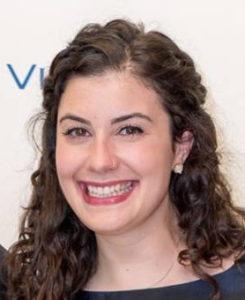Veterinary student completes IIAD externship
 The Institute for Infectious Animal Diseases (IIAD) is committed to developing training materials and fostering a learning community in the veterinary industry. In conjunction with this commitment, the Institute recently hosted a veterinary student externship.
The Institute for Infectious Animal Diseases (IIAD) is committed to developing training materials and fostering a learning community in the veterinary industry. In conjunction with this commitment, the Institute recently hosted a veterinary student externship.
Minnesota native Colette Friedenson received her bachelor’s degree from Boston University before attending Columbia University to earn her MPH in epidemiology. She also worked for a public health non-profit organization in New York City.
She said after serving in the public health sector, she found she enjoyed the intersection of the public health and veterinary medicine – a discovery that prompted her to attend veterinary school.
“The appeal of a nontraditional career combining public health and veterinary medicine was the precise reason that I applied to vet school,” Colette said. “After exploring the field of public health for a few years, I realized my true passion was understanding and preventing large-scale zoonotic diseases, such as Avian Influenza or Salmonella outbreaks in our food system.”
Colette is now a fourth-year veterinary student at the University of Pennsylvania School of Veterinary Medicine in Philadelphia. DVM candidates typically complete externships during their fourth year of veterinary school, which presents students the opportunity to apply for experiences in a variety of areas related to their interests and to receive real-world experience in different aspects of veterinary medicine. This also allows them to learn from and work directly with experienced veterinarians.
Colette said choosing to apply for an externship at IIAD was an easy decision for her due to the Institute’s extensive work towards combatting highly infectious diseases internationally with the One Health approach.
“IIAD, an organization that focuses on high-impact foreign animal and zoonotic diseases, was a perfect fit for my interests,” Colette said. “I was eager to work with veterinarians and other staff members on education, technology and scientific projects related to global animal health.”
During her externship, the team at IIAD enabled Colette to perform a variety of activities related to the public health and veterinary fields. Her experiences included: attending meetings about international public health projects, discussing the future of veterinary public health with mentors, assisting with education initiatives for field professionals, and collecting blood samples for swine surveillance programs.
Colette said the knowledge, skills and experience gained from the externship helped expand her horizons on opportunities available in the veterinary and public health fields.
“When I set out to complete this externship, I hoped to gain some hands-on experience in the niche space of infectious animal disease prevention,” Colette said. “I wanted to work with a couple of veterinarians with a public health background and hear about their careers. This experience far surpassed these goals – it opened my eyes to the many applications of veterinary medicine in the public health world. I gained a new understanding of the breadth of career choices and paths for veterinarians and public health professionals.”
After graduation, Colette intends to combine her degrees and knowledge to study, track and prevent infectious diseases from spreading among and between animals and humans. She said she hopes to develop a career that allows her to combine her clinical expertise with an epidemiological approach, which would allow her to help prevent diseases on an individual and population level.
Colette said her experience at the Institute helped her further her goals as a veterinarian.
“The externship at IIAD made a huge impact on me, especially during this last part of vet school,” Colette said. “It is amazing to work with the impressive professionals at IIAD and Texas A&M and be able to ask real questions about career choices and goals. Not only did this experience solidify my interests, but it also expanded my understanding and career goals as a veterinarian in the public health world.”


